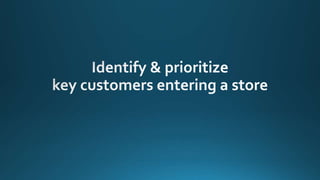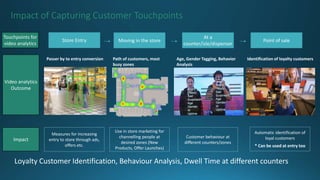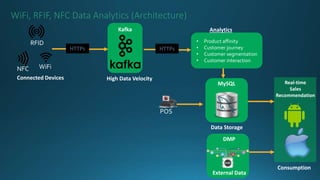Arvind Brands - Hackathon - Solution Idea
- 2. • Customer Identification, prioritization and Engagement are the key factors to increase Customer Experience and increasing the Customer Life-Time Value • In the age of e-commerce where e-retailers record every touch point of their customers and leverage that for personalized customer experience, stores lack behind in that area • With the advent of new technologies in hardware and software both, stores stand a chance to get a competitive advantage Context • Analyze past purchasing behavior (in the store) and other activities outside the store ( Digital Presence) for identification and prioritization of the customers • Map the customer journey in the store for better customer service, marketing activities and operational efficiency • Analyze customer behavior within store by sentiment analysis, feedback etc. for improvement in conversion rates through better customer service. Objectives Proposed Solution Hardware Software Tech Stack Business Intelligence Data Analytics Impact Segmentation ComputerVision Sensor Data Analytics Historical purchase data External data like social media Us of sensors, cameras for touchpoint capturing App data Increased Customer Conversion Increased Customer Experience Better Marketing Effectiveness BetterOperational Efficiency Arvind Brands: Digital Assistant
- 4. Advanced personalization using competitive information - Beacons 4 Transaction Data In-Store Presence Campaign Effectiveness Customer Profile Persona Segmentation Note: In absence of mobile app the lifestyle prediction of consumers will be through hypothesis based on similarity in-store behavioural pattern of existing consumers • Demographic Data • Lifestyle Preference • TotalTransactions Made • Average OrderAmount • Mode of Payment • Order Returned/ Cancelled • Products Purchased • Total Impression provide • Impression Viewed/Clicked • Click throughConversion Rate • Types of campaigns Viewed/Clicked • StoresVisits Frequency • Time Spent within Store • Affinity towards product SKUs • Proximity from different Beacons • Path Followed • Zones Covered • Day Parting Details Recommendation System Promotion Content Design Data Layer Analytics Layer Reporting Layer Campaign 1 Campaign 2 Campaign 3 App Usage • Time spent in App • Browsing History • PagesViewed Details • Time spent/page Analysis to be done based on data collected across multiple brands/ stores Measuring campaign effectiveness in terms of : •Store visits Frequency •Campaign contribution towards revenue •Sales Lift Analysis •Post campaign clickstream analysis
- 5. Identifying Potential Customers from 1st Party Base Understanding External Personas for multiple segments Identifying right target audience based on personas identified Estimating future potential customer using first party DMP data and adding monetary value to business through better engagement with them Understanding the right segment of customers bringing value to business with minimum acquisition cost. Segmenting target customers and profiling them in homogeneous groups using 2nd and 3rd party data like product usage, demographics, behaviour etc.. Browsing Behaviour Segments Demographic Segments Extrapolating identified persona information for targeted segment and mapping them with universal cookie base through look-alike models -> Smart Phone Users -> Urban Consumers -> Credit Card Users -> Brand Centric -> International Traveller -> Fleet Taxi Users -> Jewellery Buyers -> Food Lovers -> Movie Goers -> Youth Base -> Rural Consumers -> M Wallet users -> Tech Enthusiast -> White Collar Employ -> Deal Hunters -> Public Transport Users -> Price sensitive -> Holds Loyalty cards -> Prefer offline Store -> Food Lovers -> Movie Goers -> Youth Base -> Rural Consumers -> M Wallet users -> Tech Enthusiast -> White Collar Employ -> Deal Hunters -> Public Transport Users -> Price sensitive -> Holds Loyalty cards -> Prefer offline Store Acquiring customers with future potential through DMP (Data management platform)
- 7. Customer Effort Technology Advantages Utility Drawbacks No Wi-FiTracking • Use of in-house Wi-Fi • Almost equivalent utility as Video Analytics People counting, DwellTimes, RepeatVisitors, People tracking • Limits to a sample of audience • Inaccurate-short wavelength RF No 3D StereoVideo Additional advantages: Surveillance,Queue management, Predictive Solution People counting, DwellTimes, RepeatVisitors, People tracking • High Infrastructure cost • High Processing Cost • Complex algorithm execution • Treatment of depth No Infrared Beams • Low cost • Easy set-up People counting • Cannot recognize direction • Double counts for entering and exit • Miscount in groups No Thermal Imaging • Low cost • Easy set-up People counting Disturbances with other objects in place Yes BLE Beacons • Directly contact the customer, in real-time • Push Notifications People counting, DwellTimes, RepeatVisitors, People tracking • Audience size is significantly less • Beacon compatibility withAndroid is very less Based on store size and cost, any of these or combination can be used to capture the customer touchpoints Technologies for capturing customer touchpoints
- 8. Identification of loyalty customers Loyalty Customer Identification, Behaviour Analysis, Dwell Time at different counters Age, Gender Tagging, Behavior Analysis Passer by to entry conversion Store Entry Moving in the store At a counter/isle/dispenser Point of sale Touchpoints for video analytics Video analytics Outcome Path of customers, most busy zones Impact Measures for increasing entry to store through ads, offers etc. Use in store marketing for channelling people at desired zones (New Products, Offer Launches) Customer behaviour at different counters/zones Automatic identification of loyal customers * Can be used at entry too Impact of Capturing Customer Touchpoints
- 10. Real-time Sales Recommendation Kafka HTTPsHTTPs • Product affinity • Customer journey • Customer segmentation • Customer interaction High Data Velocity Consumption MySQL Analytics Data Storage POS WiFiNFC RFID Connected Devices DMP External Data WiFi, RFIF, NFC Data Analytics (Architecture)
- 11. Real-time Sales Recommendation REST APIs Raspberry Pi w/ Camera HTTPs * Ra-Pi Model B w/ 5 MP Camera * Elementz USBAdapter/Charger * SD Card (128 GB) – 160 mins AWS Lambda • People counting • Customer identification • Brand identification • Emotion detection • Instore customer journey • Dwell time Consumption Layer MySQL Analytics Data Storage Total Cost: $85 Kafka Data Buffer DMP External Data Image & Video Data Analytics (Architecture)











